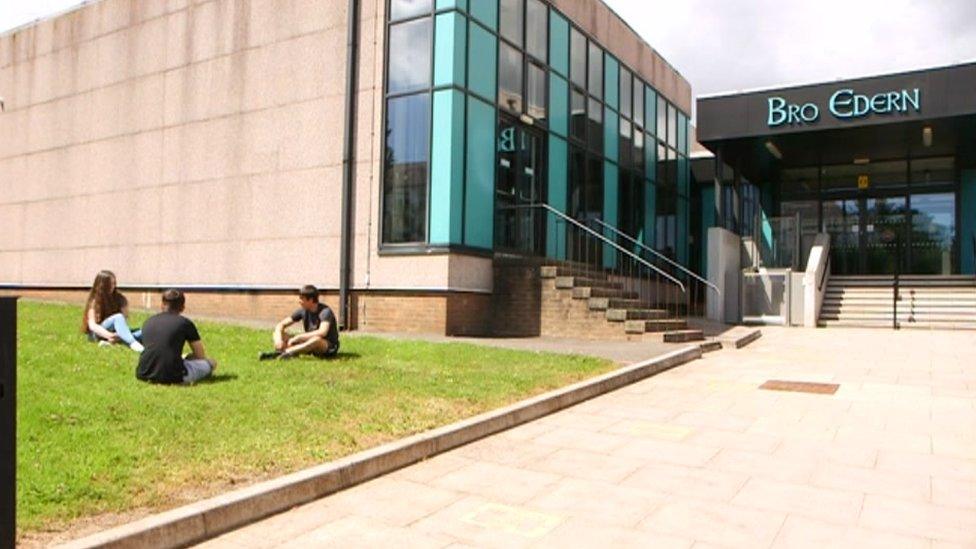GCSE and A-levels results in Wales will be 'balanced and fair', exam board says
- Published

Coronavirus closed schools and saw summer exams abandoned in Wales
Every effort is being made to ensure this year's A-level and GCSE results are decided in a "balanced and fair way" say exam bosses.
The system adopted is the best solution in the circumstances, said the head of Wales' largest exam board, the WJEC.
Predicted grades for students will be used along with other information to award results.
This year's exams were abandoned when the coronavirus pandemic struck. Results will be announced in August.
Candidates will not be able to appeal directly to the WJEC this year, though schools and colleges will be able to challenge the process.
Teachers have already sent in grades to the WJEC for all GCSE, AS, A-level and Welsh Bacc candidates, as well as ranking their pupils in order within grades.
The information is then processed by the exam board, to make sure it is consistent with how the pupil and school has performed in previous years.
The WJEC's chief executive Ian Morgan said it was a "fairly complex process".
"There's a huge amount of data being used from a range of different sources," he said.
He said they were looking for "broadly similar" results to previous years.
"What you don't want is too much of a spike either way, either upwards or downwards," he added.
"It's about maintaining that stability of the outcomes over a period of time, because we will revert back to the normal processes potentially from next year and the year after, and we need to make sure that we can maintain those standards across the piece."
He said schools, the exam board and other parts of the education system were working together to come up with a fair system for those pupils who have not been able to sit exams.
"We are collectively in extremely difficult times and I think the solution that we've come up with is probably the best solution we could come up with in the circumstances.

It is only the second year students at Bro Edern in Cardiff would have sat A-levels
But it does pose some challenges.
Ysgol Gyfun Gymraeg Bro Edern became Cardiff's third Welsh medium secondary school when it was founded in 2012.
But it means 2020 was only the second year its sixth-formers would have been sitting their A-levels.
A formula taking prior school performance into account is more difficult for a school like this, argues head teacher Iwan Pritchard.
While he accepted it was important teachers were not over-generous with their predictions for students, he said the schools' view should count.
"We've also got to remember that the pupils haven't had the opportunity to sit the exams, they haven't had the opportunity to show the WJEC and the examiners what they're capable of, and because the predicted grades are based on evidence, it's only fair for the pupils to be awarded the grades that the school felt that they deserved."
What do the students think?

A-level students should find out what they have got on 13 August, with GCSE results on 20 August
Bro Edern sixth-formers Tomos Evans and Mared Williams summed up their feelings about having no exams.
"I still don't quite understand how they are going to mark my grades," said 18-year-old Tomos, "Whether it's through predicted grades or coursework or work I've done in the classroom."
Mared said it was difficult to judge how she had done without the experience of sitting an exam.
"I'm actually more nervous at this point. I don't know what I'm expecting."
Manon Hammond, a year 12 pupil at Ysgol Plasmawr in Cardiff, said she was "scared" about her results.
"What if I get grades I don't want, I may need to rethink my plans in terms of applying for university," she said.
"Some people are also going to be helped by this because there's always difficult exams or days… but for the most part people are just relatively frustrated because it's so difficult to know when it's taken out of your hands, and also the amount of communication you can have with your teachers makes it really difficult because we're all flying blind."
Charlotte Hawkins from Wrexham is in her final year at Coleg Cambria awaiting her A-Level results and said the process was "the fairest way possible".
But she added: "I just feel like it's been taken out of my hands so I'm a bit worried because there's time in the year I found certain parts of the course difficult. And when you're revising at the end of the year you go over things again."


No exams - but there will be results for GCSE and A-level students in August
How are grades decided?
Schools and colleges have sent the exam board "centre assessed grades". That is the grade the school or college thinks the pupil would have got had they sat the exams.
They also ranked the pupils within grades too.
The WJEC then processes it, adding other information, including evidence of how the pupil has performed previously and overall results from the school or college in previous years.
So the final grade may not be the same as the grade submitted by the teacher.
Will the grades be consistent with other years?
Exam bosses say they expect the results to look "broadly similar" to previous years' grades.
The examiners are keen to ensure there is not "too much of a spike" either up or down in the grades students are given.
It is important for exams in the future, so similar standards are maintained in the coming years.
If I am unhappy with my grades, can I appeal?
Individual pupils will not be able to appeal, but their school or college can - if it feels processes have not been followed correctly.
But it is about the process - not individual grades.
Students will have to approach their school or college first.
The guidelines also stress those exam centres must explain to students why they may not be pursuing an appeal, and they must also have processes in place for students to appeal that decision.
Will there be changes to next year's exams?
The exam board is looking at every course, subject by subject.
The WJEC says it is not necessarily looking at cutting content from course, as some parts may have already been taught.
But it is looking at cutting coursework or adding more options within next year's exam papers.

Member of the Senedd (MS) Suzy Davies, who is the Welsh Conservative's spokeswoman for Education said she was "not unimpressed" with the process.
She told BBC Radio Wales Breakfast with Claire Summers: "I'm a little worried about what happens next year.
"There's been talk about changing the content or putting equivalent content in courses next year. I think that still needs to be worked through for people to have confidence for next year's GCSE and A-level students.
"This year all those students would have done five terms out of six, so relying on that information to put towards their grades is reasonable."
"But next year, as students would have missed a crucial term, they would be right to ask questions about how they're going to be assessed."
Concerns have also been raised on whether a predicted grade system could introduce bias, especially for candidates from black, Asian and minority ethnic communities.
"During the lockdown, when we started getting feelers about the disproportionate effect of Covid-19 on BAME people, we started these very wide consultations," said Patience Bentu, from Race Council Cymru.
"It was through these consultations that we were getting feedback about these anxieties."
The issue has been raised with the Education Minister Kirsty Williams, and they have since received reassurance, Ms Bentu said.
"We're very confident that it will be a fair process," she said. "But that's not to say that we're going to be complacent about it.
"We will keep an eye and watch what happens and just provide the necessary support that we need to."
- Published27 May 2020

- Published11 May 2020

- Published17 April 2020
